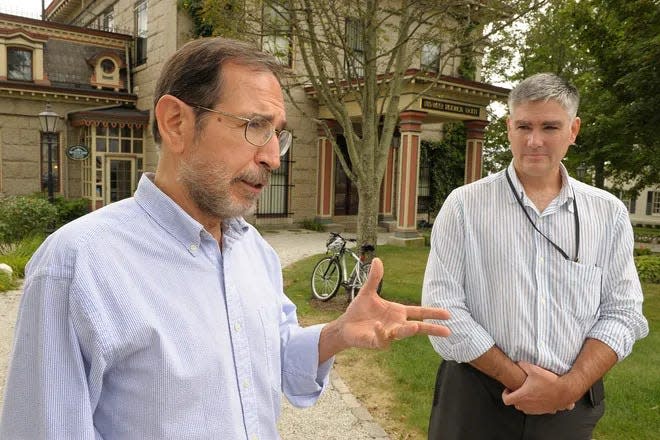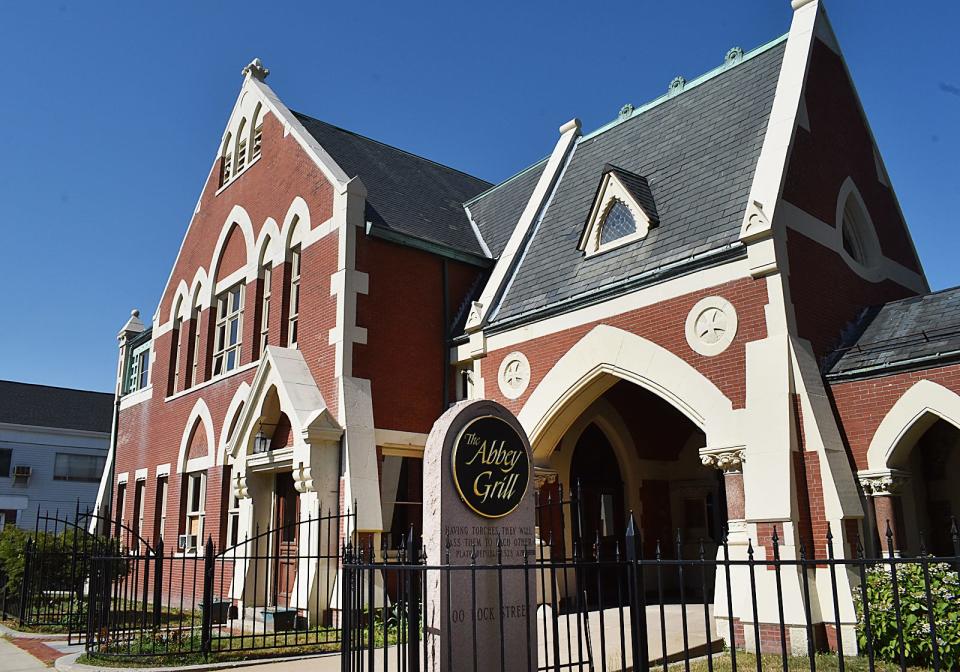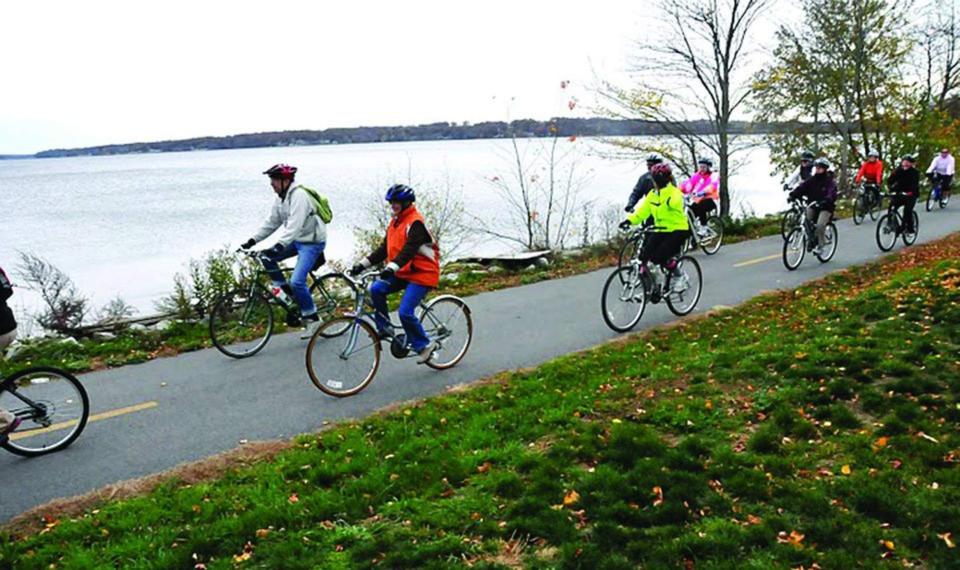'One person can make a difference': Fall River's Al Lima leaves a legacy of optimism
FALL RIVER — Only a few people in the city's history could rightfully claim to have permanently altered its landscape. Al Lima was one of them.
A titan of civic engagement, a model of political optimism, a tireless fighter for environmental and social justice, Lima spent decades in Fall River advocating for dozens of causes intended to improve the quality of life for Fall River citizens now and for generations to come. He died Tuesday after a long illness. He was 80.
The Alfred J. Lima Quequechan River Rail Trail, named in his honor, was the urban planner and activist's last great project, a swath of green space woven through the city’s heart that restored its river to a kind of beauty not seen since before the Industrial Revolution. But he also left his mark across the city, working with quiet diligence to save historic buildings like the Central Congregational Church, fight irresponsible and polluting development like an LNG terminal, help preserve 16,000 acres of woodlands in the Bioreserve, create city parks and more — usually without public recognition and never with the desire for it. According to those around him, his only wish was to spread beauty to the city of Fall River.
Saving history: Fall River OK'd the Community Preservation Act 10 years ago. Has it been worth the money?

“He’s got pure intent. He gains from nothing," says Pamela MacLeod-Lima, his wife. “Never gains, except in seeing things happen that he thinks will benefit the city.”
Fall River's motto, “We’ll Try,” often derided as an expression of apathy or futility, was to Lima instead a template for being, the start of his daily to-do list — a quiet, stolid expression of perseverance in the face of opposition. The motto isn't singular. It's “we,” plural — “we will try.” Lima knew he couldn’t do everything himself. He needed people of like mind, a community, helpers, friends. He had them.
Stefani Koorey says when working with Lima during the late 2000s and early 2010s in the group Save Our Neighborhoods to preserve public spaces, she and others would become despondent when the city’s historic treasures fell to rubble at the business end of bulldozers and private developers. They'd tell him, “Fall River’s never going to change, Al.”
“And he said, ‘But we can try,’” Koorey says. “And so we went, ‘OK, Al — what's next?’”

A passion for history and nature
“He was a Fall River boy, born and bred,” says Michael Martins, curator of the Fall River Historical Society. “He loved the city and was so passionate about the environment and history.”
Lima was born Dec. 5, 1941, and educated at Bristol County Agricultural High School — a star track team member, says lifelong friend Everett Castro. Lima took his love of nature to the University of Massachusetts Amherst, where in 1963 he earned a degree in landscape architecture. He’d expand from designing landscapes to entire cities, earning a graduate degree in urban planning from the University of Pennsylvania.
Planning was his profession for over four decades. Briefly a junior city planner in Fall River, he moved on to become a planner and consultant for cities including Concord, Franklin, Marlboro and others.
“He realized that planning consists of more than drawing out a few plans and zoning and restrictions and things of that type," Castro says. “It included everything: transportation, residential areas, businesses, industry — and open space, watershed protection. … [He believed] everything should be tied together and every neighborhood should have a green space. He was way, way ahead of his time.”
That advocacy for green space and environmentally responsible development sometimes caused him to butt heads with administrations he worked for.
“He was an urban planner, but he was also an activist and a conservationist. And sometimes those things were in conflict," MacLeod-Lima says.
But Lima’s style was to look backward to history and forward to possibility, and quietly, persistently strive for a better tomorrow. He often won his fights, and would be vindicated years later. His wife says the city manager of Marlboro recently called her and said, “There are things happening 15 years later, that Al put in motion, that are good for the city.”
Beyond the Satanic Panic: Fall River Bioreserve's true story is full of history and beauty

Al Lima's history of improving Fall River
“A couple of times, people approached him about running for office,” MacLeod-Lima says. “And he said, 'Oh, no. I can get much more done as a gadfly.’”
In every fight for the future of Fall River’s soul that has taken place in the last several decades, Lima had a role as an activist. In the late 1980s, the Central Congregational Church on Rock Street was due for the wrecking ball — a magnificent tribute to God wrought in brick, iron and granite in 1875, destined to become a parking lot. Lima and his wife, leading the citizen group SAVE (Save Architecturally Valuable Edifices), were instrumental in buying and saving the iconic church in 1991. When the church was nearly demolished again in the 2010s — again for a parking lot — SAVE was there once more.

Lima was part of or consulted with multiple citizen action groups: Save Our Neighborhoods, the Preservation Society of Fall River, the Coalition for Clean Air, director of environmental research at Green Futures with his friend Everett Castro. Jim Soule of the Preservation Society called him "a preservation icon for the city of Fall River. … He is so integral to so many different efforts across the city.”
Lima helped save Broadview, the historic home of Sarah Brayton on Highland Avenue. With Green Futures and other organizations, Lima was among the voices key to establishing, two decades ago, the 16,000-acre Southeastern Massachusetts Bioreserve, a vast woodland in Fall River’s eastern half that mixes environmental preservation and recreation — MacLeod-Lima recalls her husband bringing then-Mayor Ed Lambert to some of the trails in that area and showing him the area’s beauty and potential. When in the 2010s energy company Hess attempted to construct an LNG offloading and storage facility along the Taunton River waterfront on North Main Street, he was part of the broad coalition that killed that proposal. He was at the forefront of the fight that shut down the city’s polluting incinerator, and coal-fired power plants in Somerset. When Fall River’s neighborhood schools were closed, Lima was a persistent voice in the City Council’s ear, urging them to wait before selling off public land, and reconsider its use as public space.

According to Koorey, he was a fixture at Zoning Board meetings. “Al was one of those guys that paid attention,” she says, “and held their feet to the fire."
These efforts take money, Lima knew. He and his wife helped spearhead efforts to bring the Community Preservation Act to Fall River a decade ago, a law which dedicates a portion of real estate taxes to saving historic properties and open space.
“People told us at meetings, 'Oh that’ll never fly in Fall River. Nobody will ever vote that in," Castro says.
Lima was undeterred, fueled by bottomless optimism. He and his wife canvassed door to door and at elderly housing, giving presentations about Fall River’s past, present and a possible future if the city approved the CPA. Their enthusiasm proved infectious. The law passed in every precinct, Fall River being the first Gateway City to adopt it, opening up funding to save many of Fall River’s treasures.
“As far as I’m concerned, he was one of Fall River’s treasures,” says Sandy Dennis, administrator of the city’s Community Preservation Committee.
“He cared about environmental justice,” Koorey says. “He cared about social justice. He cared about Fall River getting to be a place for the people who live there to enjoy their lives and have a better life.”

Lima's love for the Quequechan River
Lima’s later years were spent on multiple projects centered around the Quequechan River. He drafted plans to daylight the river again, decades after the city's waterfalls were demolished and the river buried to make way for Interstate 195 in the 1960s, and shopped this plan around to administrations for over 10 years.
The creation of the Quequechan River Rail Trail was perhaps his most prominent achievement, and embodied his philosophy as an urban planner — more than simply a bike path, it looked back to and honored the city’s past, cleaned up a long-neglected and polluted part of Fall River, inserted green space into a neighborhood where it was sorely lacking, and became a new way to connect people in neighborhoods that had been separated. And he hadn't even been a cyclist, Castro says — it was just a feature he felt would make Fall River more beautiful.

Castro says that prior to his designing it, “Al, who I don’t think had ridden a bike since he was much younger, actually bought a bike or had one in the basement and began to ride it.”
The rail trail has a final phase due to be completed in the coming seasons, which involves improving the trail just south of Britland Park and connecting it with a bridge to the rest of the bike path. In recent years, Lima suffered from multiple strokes and battled cancer, was not able to walk and suffered from aphasia. He still kept working to extend the path, even if he couldn’t see it.
“Poor Al, he hasn’t even been able to be on his own bike path since 2014 when he had his strokes,” MacLeod-Lima says. “But he’s still been working on what we call Al Lima’s March to the Sea — trying to connect it all the way down to the Cape and make it more safe.”
His plans to daylight the Quequechan, a river Lima so loved that he wrote an entire history book about it, have not come to fruition — yet. Castro notes that every message Lima sent him about one of their projects would always the same way: “We have to find a way to make this happen, and we will. —Al.”

'One person can make a difference'
"He was supposed to live forever," Koorey says. “It was important that he live forever, because he was such an optimist about Fall River, and he was the only true optimist about the city I’ve ever met.”
Castro says he called Lima, with his perpetual Pollyanna attitude, “Polly-Andy.” “Al was like from another era," he says. “He was a real gentleman. Always polite. Always optimistic.”
“I looked up to him in every possible way,” Koorey adds. “I was in love with him. I was madly in love with him in a mentor kind of way. He taught me so much and that’s why it hurts so much that he’s not around.”
While friends and colleagues loved Lima the indefatigable cheerleader for Fall River, the oral historian, and the gifted artist, Lima's wife loved him as a soulmate. They were married for 43 years and have lived in their Hood Street Victorian home for nearly as long. They met, of all places, at a class for disco dancing lessons.
“He had learned early on that knowing how to dance gets you girls,” she says, which soon proved correct. “Our teacher kept putting the two of us together, because she kept saying, 'You two are the best two dancers in the class.’ … She came to our wedding.”

MacLeod-Lima jokes that while some couples share romantic songs, “Our song is ‘Boogie Oogie Oogie.’ When that comes on, we have a whole number to do to that song.”
The two chose not to have children, and they’ve long loved and treated extended family’s children as their own, and their children as grandchildren. They also played host to exchange students over the years, with whom they still keep in contact. “One of them, Mauricio, just visited, and he’s so attached to Al, and learned so much from him in the year that he was with us. … We got to influence young people’s lives in our own way.”
More than anything, she said, she’ll remember her husband’s gift for never succumbing to despair.
"You may be only one, but you are one,” she says. “You can’t let the fact that you’re only one stop you from doing what can be done by one person. He understood that better than anyone, that one person can make a difference."
Lima’s wake will be held from 4 to 7 p.m. on Oct. 27 at Hathaway Funeral Home, 1813 Robeson St. A funeral service will be held Oct. 28 at Holy Name Church, 709 Hanover St.
Dan Medeiros can be reached at [email protected]. Support local journalism by purchasing a digital or print subscription to The Herald News today.
This article originally appeared on The Herald News: Fall River's Al Lima, historian, urban planner, activist dies at 80
